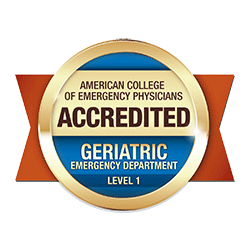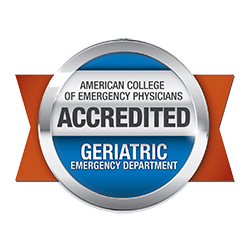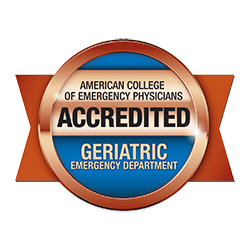Find an Emergency Department Near You
When Should I Go to the ED?
When it comes to medical emergencies like stabbing chest pains, high fevers and vomiting that won’t go away, getting treatment quickly is a must. Cleveland Clinic’s emergency department is here for you — day or night.
So, how do you know if an ED visit is right for you? It depends on what’s going on. We want you to come to us for things like:
- Accidents, including falls and car crashes
- Chest pain
- Coughing up or vomiting blood
- Drug overdose
- Fever
- Head injuries
- Injuries caused by violence
- Life-threatening conditions
- Loss of consciousness
- Major trauma
- Poisoning or suspected poisoning
- Severe burns
- Severe headaches
- Severe or persistent abdominal pain
- Shortness of breath
- Sudden or unexpected paralysis (stroke symptoms)
- Suicidal or homicidal feelings
- Uncontrolled or excessive bleeding
Quick care for non-emergencies
Do you have constant sinus pressure or ear pain? Or does it look like your kid shared their pink eye with you? These may not be emergencies needing ED care — but they are things you’ll want to get checked out on the same day.
So, where do you go? Cleveland Clinic has the answers you need. You can choose from our walk-in options like Express Care® Clinics or urgent care. Or you can see one of our providers virtually via an Express Care® Online virtual visit.
What to Expect During Your Emergency Department Visit
When you come to one of our EDs, you’ll go through a five-step process when you arrive.
- Registration: A member of our team will register your name and reason for visit in our system.
- Triage: We’ll collect your reason for the visit, get your medical history and medications list, and check your vital signs.
- Treatment: One of our doctors, nurse practitioners or physician assistants will order tests and treatment.
- Re-evaluation: Our team will look at testing and initial treatment results to see if you need further care.
- Being admitted to the hospital or going home: We’ll decide this based on your condition, test results and treatment response.
Taking a Virtual Step Against Overcrowded EDs
Emergency departments face overcrowding every day — including ours. While our ED teams work as quickly as possible to see everyone, you still may have a long wait.
Triage helps us keep things moving a little faster in the ED. It lets us quickly check each person and treat those with the most life-threatening conditions first.
Now, we’re taking triage to the next level with our Virtual Emergency Medicine program. It allows us to tackle congested waiting rooms and speed things up even more. Once you’re at our ED, you may meet virtually with one of our skilled emergency medicine providers. This can help fast-track your evaluation.
During this tablet-based virtual visit, our provider will ask about your symptoms, order any needed tests and guide you through the next steps. That could be more testing, getting prescriptions, going home or moving forward with more intensive ED care.
Pediatric Emergency Departments
When it's an emergency, you can feel confident knowing your child can quickly get the care they need. With dedicated pediatric emergency departments on both the East and West sides, we're here when you need us for anything from serious illnesses to critical injuries. We'll take care of your child quickly to help reduce your stress — with less waiting.
How is a pediatric emergency department unique?
- Specialty trained staff in pediatric emergency care.
- Separate waiting room for children.
- Pediatric-only treatment rooms and equipment.
- Child life specialists help children and their families experience less trauma and anxiety during their emergency department visit.
Pediatric Emergency Department Locations
All of our emergency departments at our main campus and community hospitals are able to treat children. The following hospitals provide dedicated pediatric emergency care:
Not sure where to go for care?
The emergency department is a busy place! Longer wait times are common. If your condition isn’t life-threatening, know that your insurance company could deny payment. In that case, please consider alternative walk-in options such as a Cleveland Clinic Express Care® Clinic or urgent care clinic. You can also see a provider with a virtual visit from your laptop, tablet or smart phone using Express Care® Online.
Have questions about payment?
Most insurance plans are accepted. Payment, including co-pays, is required at time of service.
Specialized Care for Seniors
Emergency medicine and geriatric specialists work together to assess and treat the complex, unique concerns of those age 65+.
Most Cleveland Clinic emergency departments (EDs) in Northeast Ohio have earned Geriatric Emergency Department Accreditation (GEDA) from the American College of Emergency Physicians. National accreditation means these EDs meet rigorous requirements to standardize and improve emergency care of older, high-risk adults.
Enhanced care for senior patients
- Located within the regular emergency department.
- Private evaluation area with a comforting environment and geriatric supplies/equipment.
- Provide rapid assessment and treatment for life-threatening conditions.
- Emergency medicine and geriatric providers allocate additional time and resources to evaluate all aspects of the senior patient, including:
- Memory/mental health concerns.
- Mobility issues.
- Adverse drug reactions resulting from taking multiple medications.
- Lack of social support.
- Vague symptoms like confusion, weakness, lethargy or “just not acting right,” which may be due to an underlying medical condition.
- Coordinate care across specialties, which may involve pharmacy, physical therapy, and social work.
- Develop a plan of care and determine next steps: whether the patient can be treated and sent home, admitted to the hospital, transitioned to a skilled nursing or rehabilitation facility, or prescribed home care services.
- Once evaluated, the patient will have access to the Successful Aging Program at the Center for Geriatric Medicine to maintain the continuity of care.
GEDA Locations
 |
Cleveland Clinic Emergency Departments with Level 1 GEDA status: Cleveland Clinic Main Campus |
 |
Cleveland Clinic Emergency Departments with Level 2 GEDA status: |
 |
Cleveland Clinic Emergency Departments with Level 3 GEDA status: |